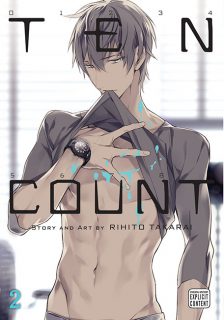My News and Reviews
Every month I post a Bookshelf Overload feature which takes a quick look at some of the manga and other media that make their way onto my shelves at home. And so last week I published February’s Bookshelf Overload. As I mentioned in that post, I’m currently working on an in-depth review of Kazuto Tatsuta’s Ichi-F: A Worker’s Graphic Memoir of the Fukushima Nuclear Power Plant. I expect that it should be ready to post later this week (that’s my intention anyway), but I’m also incredibly busy right now getting ready to change jobs. Taiko performance season is also steadily ramping up, and the Lion Dance troupe is still getting regular performance requests, so I’ve had a bunch of extra rehearsals and less downtime in general, too. Still, the writing is slowly but surely happening!
Despite being so busy and not being online as much as usual, I did come across a few interesting reads last week. Jennifer Robertson (who I’ve actually briefly met before) recently wrote for Salon about Japan’s long history of blurred sexualities and gender-bending. Brian Hibbs takes his annual look at the BookScan numbers for comics and graphic novels for The Beat. The analysis includes a section specifically devoted to the manga being released in English. Finally, in what I think is terrific news, more of Yen Press’ digital-only titles will now be getting print editions, too! Look out later this year for Homura Kawamoto and Toru Naomura’s Kakegurui: Compulsive Gambler, Higasa Akai’s The Royal Tutor, and Sakurako Gokurakuin’s Sekirei. Finally, a Kickstarter campaign was launched to publish anime director Yasuhiro Irie’s manga Halloween Pajama in English.
Quick Takes
 The Ghost in the Shell, Volume 1 by Masamune Shirow. It’s been a long time since I’ve read Shirow’s The Ghost in the Shell. The series was actually among one of the first manga that I encountered. My introduction to the franchise was through Mamorou Oshii’s animated film Ghost in the Shell which probably remains my favorite interpretation of the story and characters. I actually often find the manga to be very difficult to follow. Shirow has some great, thought-provoking and intriguing ideas, but the flow of the story can be extremely disjointed at times. A live-action American Ghost in the Shell film will soon be hitting theaters, so it makes sense that Kodansha Comics would take advantage of the opportunity to re-release the original The Ghost in the Shell manga in a beautifully-produced deluxe hardcover edition. This “definitive” version is being presented in right-to-left format with Japanese sound effects for the first time. I’m fairly certain there are more color pages included, too, but the volume does lack some of the additional textual content found in previous English editions. The controversial lesbian sex scene has also been excluded at the creator’s request which does cause some slight narrative confusion.
The Ghost in the Shell, Volume 1 by Masamune Shirow. It’s been a long time since I’ve read Shirow’s The Ghost in the Shell. The series was actually among one of the first manga that I encountered. My introduction to the franchise was through Mamorou Oshii’s animated film Ghost in the Shell which probably remains my favorite interpretation of the story and characters. I actually often find the manga to be very difficult to follow. Shirow has some great, thought-provoking and intriguing ideas, but the flow of the story can be extremely disjointed at times. A live-action American Ghost in the Shell film will soon be hitting theaters, so it makes sense that Kodansha Comics would take advantage of the opportunity to re-release the original The Ghost in the Shell manga in a beautifully-produced deluxe hardcover edition. This “definitive” version is being presented in right-to-left format with Japanese sound effects for the first time. I’m fairly certain there are more color pages included, too, but the volume does lack some of the additional textual content found in previous English editions. The controversial lesbian sex scene has also been excluded at the creator’s request which does cause some slight narrative confusion.
 Monthly Girls’ Nozaki-kun, Volumes 5-6 by Izumi Tsubaki. I love Monthly Girls’ Nozaki-kun so incredibly much. This series, along with My Love Story!!, is something that I can always count on to make me happy. I find myself constantly smiling while reading Monthly Girls’ Nozaki-kun and on more than one occasion have even caught myself laughing out loud. At this point the manga series is far enough along that almost all of the content is new to me. (My introduction to Monthly Girls’ Nozaki-kun was through the anime adaptation which is likewise an absolutely wonderful series.) There are new scenarios and even new characters–Nozaki’s younger brother and his judo teammates have become more prominent as one example–but those that were previously established are never forgotten. The good-natured humor in Monthly Girls’ Nozaki-kun remains consistent throughout the manga. Most of the hilarity is the result of the fact that none of the characters quite manage to be on the same page as any of the others and the ridiculousness that ensues because of it. The quirky characters themselves are incredibly endearing, too, even if they’re not particularly nuanced.
Monthly Girls’ Nozaki-kun, Volumes 5-6 by Izumi Tsubaki. I love Monthly Girls’ Nozaki-kun so incredibly much. This series, along with My Love Story!!, is something that I can always count on to make me happy. I find myself constantly smiling while reading Monthly Girls’ Nozaki-kun and on more than one occasion have even caught myself laughing out loud. At this point the manga series is far enough along that almost all of the content is new to me. (My introduction to Monthly Girls’ Nozaki-kun was through the anime adaptation which is likewise an absolutely wonderful series.) There are new scenarios and even new characters–Nozaki’s younger brother and his judo teammates have become more prominent as one example–but those that were previously established are never forgotten. The good-natured humor in Monthly Girls’ Nozaki-kun remains consistent throughout the manga. Most of the hilarity is the result of the fact that none of the characters quite manage to be on the same page as any of the others and the ridiculousness that ensues because of it. The quirky characters themselves are incredibly endearing, too, even if they’re not particularly nuanced.
 Ten Count, Volume 2-3 by Rihito Takarai. Well now, that escalated quickly. From the very first volume Ten Count presented itself as a dark psychological drama, but if anything its intensity only increases as the series progresses. The relationship between Shirotani and Kurose is an incredibly unhealthy one which only becomes more troubling as sexual elements are introduced to it. Kurose, whether or not he realizes it or intends to be, is abusive, manipulative, and controlling. He pushes Shirotani, often without consent or consideration, to his limits and beyond. Shirotani does have some personal breakthroughs but heartbreaking glimpses into his past and into his current emotional and mental states reveal a man who is conflicted and struggling with his own self-worth. Frankly, I find Ten Count to be disturbing and unsettling, verging on psychological horror rather than romance. At this point I can’t really envision things turning out well. (Honestly, I’d probably feel disappointed or even somewhat betrayed if Takarai manages some sort of romanticized happy ending.) To me Ten Count is still immensely engrossing, but I certainly can’t blame anyone who would want to avoid the series.
Ten Count, Volume 2-3 by Rihito Takarai. Well now, that escalated quickly. From the very first volume Ten Count presented itself as a dark psychological drama, but if anything its intensity only increases as the series progresses. The relationship between Shirotani and Kurose is an incredibly unhealthy one which only becomes more troubling as sexual elements are introduced to it. Kurose, whether or not he realizes it or intends to be, is abusive, manipulative, and controlling. He pushes Shirotani, often without consent or consideration, to his limits and beyond. Shirotani does have some personal breakthroughs but heartbreaking glimpses into his past and into his current emotional and mental states reveal a man who is conflicted and struggling with his own self-worth. Frankly, I find Ten Count to be disturbing and unsettling, verging on psychological horror rather than romance. At this point I can’t really envision things turning out well. (Honestly, I’d probably feel disappointed or even somewhat betrayed if Takarai manages some sort of romanticized happy ending.) To me Ten Count is still immensely engrossing, but I certainly can’t blame anyone who would want to avoid the series.
 Dragnet Girl by Yasujiro Ozu. I recently had the opportunity to see Ozu’s silent film Dragnet Girl in a theater narrated by a professional benshi and accompanied by music cued by a prominent local DJ. There was even a brief lecture beforehand which I wasn’t expecting but found interesting. I enjoyed the production as a whole immensely–it was one of those once-in-a-lifetime events–but I also specifically enjoyed the film itself. (I really ought to seek out more of Ozu’s work.) Dragnet Girl is a gangster film which largely follows Tokiko and her boyfriend Joji, a retired boxing champion and current small-time crime boss. Hiroshi, a promising young hoodlum, joins the boxing gym and their gang. His older sister Kazuko worries about him and so tries to convince Joji to make her brother leave. Some romantic entanglements and turmoil ensue, but eventually Tokiko and Joji decide to leave their life of crime together but only after they pull off one last heist for the sake of Kazuko. Dragnet Girl is available from Criterion, collected together with two more of Ozu’s silent crime films, Walk Cheerfully and That Night’s Wife. It won’t quite be the same as watching it “live,” but it’s wonderful that there’s a home release readily available at all.
Dragnet Girl by Yasujiro Ozu. I recently had the opportunity to see Ozu’s silent film Dragnet Girl in a theater narrated by a professional benshi and accompanied by music cued by a prominent local DJ. There was even a brief lecture beforehand which I wasn’t expecting but found interesting. I enjoyed the production as a whole immensely–it was one of those once-in-a-lifetime events–but I also specifically enjoyed the film itself. (I really ought to seek out more of Ozu’s work.) Dragnet Girl is a gangster film which largely follows Tokiko and her boyfriend Joji, a retired boxing champion and current small-time crime boss. Hiroshi, a promising young hoodlum, joins the boxing gym and their gang. His older sister Kazuko worries about him and so tries to convince Joji to make her brother leave. Some romantic entanglements and turmoil ensue, but eventually Tokiko and Joji decide to leave their life of crime together but only after they pull off one last heist for the sake of Kazuko. Dragnet Girl is available from Criterion, collected together with two more of Ozu’s silent crime films, Walk Cheerfully and That Night’s Wife. It won’t quite be the same as watching it “live,” but it’s wonderful that there’s a home release readily available at all.
Leave a Reply